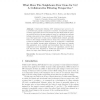Free Online Productivity Tools
i2Speak
i2Symbol
i2OCR
iTex2Img
iWeb2Print
iWeb2Shot
i2Type
iPdf2Split
iPdf2Merge
i2Bopomofo
i2Arabic
i2Style
i2Image
i2PDF
iLatex2Rtf
Sci2ools
UM
2009
Springer
2009
Springer
What Have the Neighbours Ever Done for Us? A Collaborative Filtering Perspective
Collaborative filtering (CF) techniques have proved to be a powerful and popular component of modern recommender systems. Common approaches such as user-based and item-based methods generate predictions from the past ratings of users by combining two separate ratings components: a base estimate, generally based on the average rating of the target user or item, and a neighbourhood estimate, generally based on the ratings of similar users or items. The common assumption is that the neighbourhood estimate gives CF techniques a considerable edge over simpler average-rating techniques. In this paper we examine this assumption more carefully and demonstrate that the influence of neighbours can be surprisingly minor in CF algorithms, and we show how this has been disguised by traditional approaches to evaluation, which, we argue, have limited progress in the field. Key words: Recommender Systems, Collaborative Filtering, Predictive Accuracy
Modern Recommender Systems | Neighbourhood Estimate | Programming Languages | Recommender Systems | UM 2009 |
| Added | 27 May 2010 |
| Updated | 27 May 2010 |
| Type | Conference |
| Year | 2009 |
| Where | UM |
| Authors | Rachael Rafter, Michael P. O'Mahony, Neil J. Hurley, Barry Smyth |
Comments (0)

